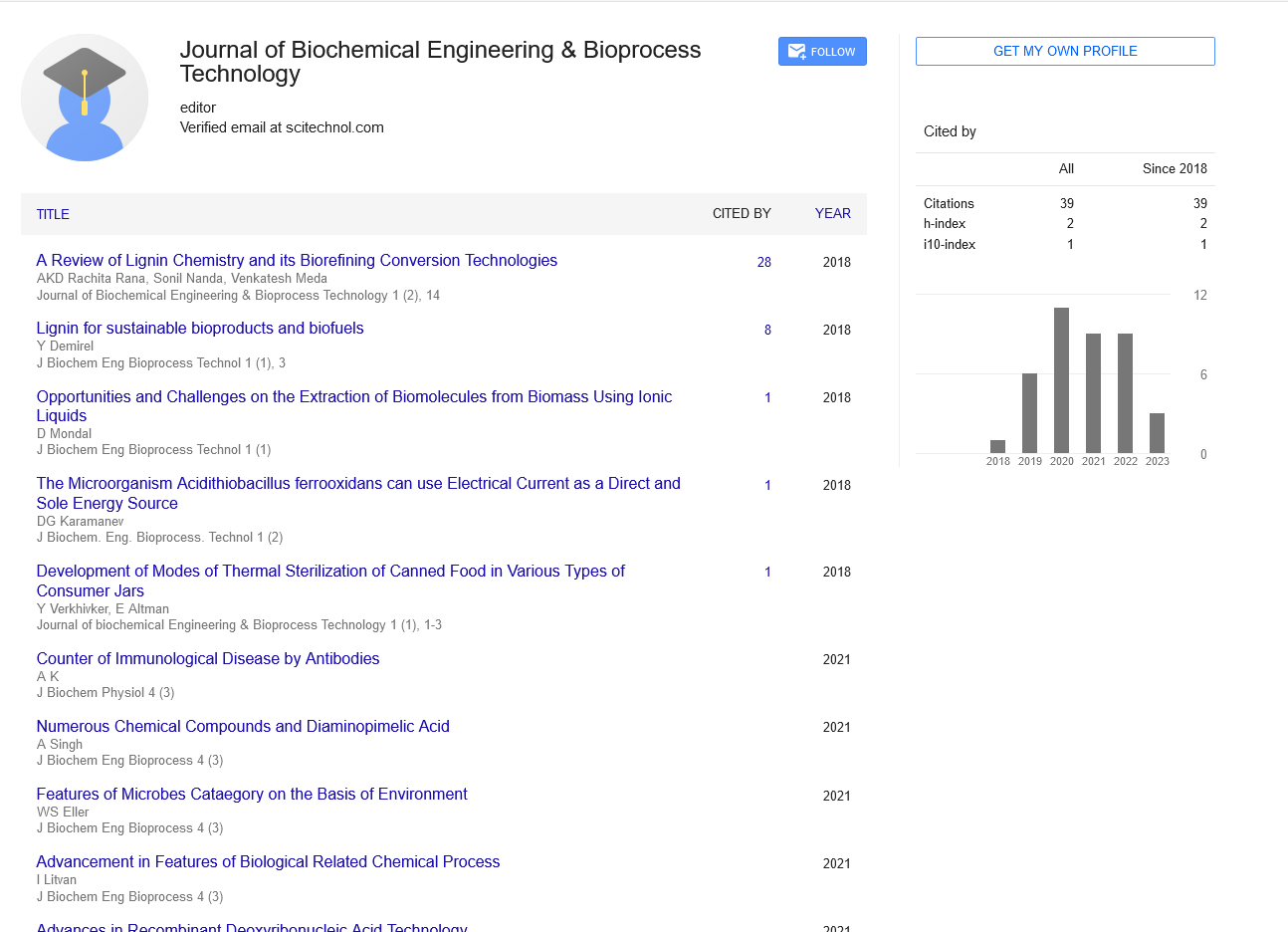Commentary, J Biochem Eng Bioprocess Vol: 6 Issue: 3
The Effects of Metabolic Engineering on the Manufacturing of Pharmaceuticals
Ayush Hussain*
1Department of Biotechnology, Jiangnan University, Jiangsu, China
*Corresponding Author: Ayush Hussain,
Department of Biotechnology, Jiangnan
University, Jiangsu, China
E-mail: hussaina68@gmail.com
Received date: 17 August, 2023, Manuscript No. JBEBT-23-118346;
Editor assigned date: 21 August, 2023, PreQC No. JBEBT-23-118346 (PQ);
Reviewed date: 04 September, 2023, QC No. JBEBT-23-118346;
Revised date: 14 September, 2023, Manuscript No. JBEBT-23-118346 (R);
Published date: 22 September, 2023, DOI: 10.4172/jbebt.1000066
Citation: Hussain A (2023) The Effects of Metabolic Engineering on the Manufacturing of Pharmaceuticals. J Biochem Eng Bioprocess 6:3.
Description
In the dynamic world of pharmaceuticals, innovation and efficiency are paramount. As we seek to develop new drugs and enhance the production of existing ones, the role of metabolic engineering has become increasingly significant. This multidisciplinary field combines biology, genetics, and engineering principles to manipulate the metabolic pathways of microorganisms, enabling the efficient production of pharmaceutical compounds. In this article, let’s explore the applications of metabolic engineering in pharmaceutical production and its potential to revolutionize the industry.
Metabolic engineering is the science of modifying the metabolic pathways of microorganisms, such as bacteria, yeast, and fungi, to optimize their ability to produce specific compounds. In the context of pharmaceuticals, it involves altering the genetic makeup of these microorganisms and fine-tuning their metabolic processes to generate pharmaceutical molecules.
One of the most important applications of metabolic engineering in pharmaceuticals is the production of antibiotics. The demand for novel antibiotics is ever-present due to antibiotic resistance, and metabolic engineering offers a way to produce these life-saving drugs more efficiently.
For example, Streptomyces bacteria, known for their antibioticproducing capabilities, can be genetically modified to enhance antibiotic yields. By manipulating the expression of genes involved in antibiotic biosynthesis and optimizing culture conditions in bioreactors, metabolic engineers can increase production rates and develop new antibiotics.
Therapeutic proteins, such as insulin, monoclonal antibodies, and growth factors, are fundamental in modern medicine. Metabolic engineering has revolutionized the production of these proteins. Traditionally, they were extracted from animal or human sources, which posed challenges related to supply, safety, and ethical concerns.
Microorganisms like Escherichia coli (E.coli) and yeast are now commonly used as bioreactors for therapeutic protein production.
Genetic modifications and metabolic engineering techniques enhance their ability to express and secrete these proteins efficiently. This not only ensures a stable and scalable supply of therapeutic proteins but also reduces the cost of production.
Metabolic engineering is instrumental
Metabolic engineering is instrumental in the synthesis of drug precursors, the building blocks from which pharmaceutical compounds are derived. By engineering microorganisms to produce these precursors, the pharmaceutical industry can reduce its reliance on complex chemical synthesis processes and improve the sustainability of drug manufacturing.
For instance, the production of artemisinin, a vital component of antimalarial drugs, has been made more efficient through metabolic engineering. Yeast strains have been modified to synthesize artemisinic acid, which can then be converted into the antimalarial drug. This approach has increased the availability of this life-saving medicine in regions affected by malaria.
Many pharmaceuticals are derived from natural compounds, such as alkaloids and polyketides, which can be challenging to extract from their natural sources in sufficient quantities. Metabolic engineering addresses this issue by enabling the biosynthesis of these compounds in microorganisms.
For example, the anti-cancer drug paclitaxel (Taxol) is typically sourced from the Pacific yew tree. Metabolic engineers have produced yeast strains capable of producing paclitaxel precursors, thus reducing the environmental impact and cost associated with harvesting this rare tree.
Metabolic engineering also plays a pivotal role in improving the characteristics of microorganisms used in drug production. By enhancing the strain's ability to grow, survive in challenging conditions, and efficiently produce the target compounds, the pharmaceutical industry can optimize its manufacturing processes.
For example, metabolic engineers have developed more robust strains of bacteria for the production of vitamin B12, an essential pharmaceutical ingredient. These genetically improved strains can better withstand the stresses of large-scale production and offer higher yields.
Conclusion
The application of metabolic engineering in pharmaceutical production is revolutionizing the industry. By manipulating the metabolic pathways of microorganisms, we can increase the efficiency, yield, and sustainability of pharmaceutical manufacturing processes. This not only ensures a stable supply of vital drugs but also has the potential to reduce production costs, increase the availability of life-saving medicines, and address precarious challenges like antibiotic resistance and the environmental impact of drug manufacturing. In the relentless pursuit of improving human health, metabolic engineering has firmly established itself as a game-changing technology in the pharmaceutical world.
